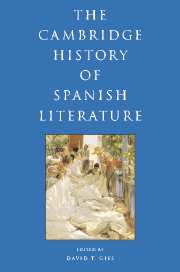Book contents
- Frontmatter
- I INTRODUCTION
- II HISTORY AND CANONICITY
- III THE MEDIEVAL PERIOD
- IV EARLY MODERN SPAIN: RENAISSANCE AND BAROQUE
- V THE ENLIGHTENMENT AND NEOCLASSICISM
- 17 Spain and Enlightenment
- 18 Eighteenth-century Neoclassicism
- 19 Eighteenth-century prose writing
- 20 Eighteenth-century poetry
- 21 Neoclassical versus popular theatre
- VI THE FORGING OF A NATION: THE NINETEENTH CENTURY
- VII THE MODERN, MODERNISMO, AND THE TURN OF THE CENTURY
- VIII TWENTIETH-CENTURY SPAIN AND THE CIVIL WAR
- IX IN AND OUT OF FRANCO SPAIN
- X POST-FRANCO SPANISH LITERATURE AND FILM
- Bibliography
- Index
- References
20 - Eighteenth-century poetry
from V - THE ENLIGHTENMENT AND NEOCLASSICISM
Published online by Cambridge University Press: 28 March 2008
- Frontmatter
- I INTRODUCTION
- II HISTORY AND CANONICITY
- III THE MEDIEVAL PERIOD
- IV EARLY MODERN SPAIN: RENAISSANCE AND BAROQUE
- V THE ENLIGHTENMENT AND NEOCLASSICISM
- 17 Spain and Enlightenment
- 18 Eighteenth-century Neoclassicism
- 19 Eighteenth-century prose writing
- 20 Eighteenth-century poetry
- 21 Neoclassical versus popular theatre
- VI THE FORGING OF A NATION: THE NINETEENTH CENTURY
- VII THE MODERN, MODERNISMO, AND THE TURN OF THE CENTURY
- VIII TWENTIETH-CENTURY SPAIN AND THE CIVIL WAR
- IX IN AND OUT OF FRANCO SPAIN
- X POST-FRANCO SPANISH LITERATURE AND FILM
- Bibliography
- Index
- References
Summary
Renewal in the field of poetry in eighteenth-century Spain had as twin reference points the debate over the validity of models inherited from the Baroque period, increasingly seen as no longer viable, and the cultivation of a new poetic style to which subsequent criticism would attach the label “Neoclassical.” The battles over poetry, of political as well as aesthetic significance and regularly waged in satirical writings, reached their highpoint in the final years of the century.
Verse had long been considered the unquestioned and most valued form of literary expression. For centuries literary norms, accepted as such by writers, dictated that verse was the only valid medium for what was then called “bellas letras” (belles lettres), which we now refer to simply as literature; prose, by default, was relegated to the realm of rhetorical writings. If “literatura” was everything written, “poesía” was what was written in verse, whether lyric, epic, or dramatic poetry. Even at the end of the century it was still generally considered unacceptable for theatrical works to be written in prose. Those who did so were accused of not being able to write in verse, since verse demanded subtlety, which, in the opinion of some critics, prose lacked.
In general, eighteenth-century Spanish poetry opted for clarity, even at the risk of being considered prosaic and cold. Eighteenth-century verse embraced a wide variety of styles, from popular forms such as street ballads and prayers, which did not die out until the twentieth century, to the innovative compositions of enlightened or philosophical poetry which reflected new currents of thought appearing at the end of the century.
- Type
- Chapter
- Information
- The Cambridge History of Spanish Literature , pp. 323 - 332Publisher: Cambridge University PressPrint publication year: 2005
References
- 1
- Cited by

